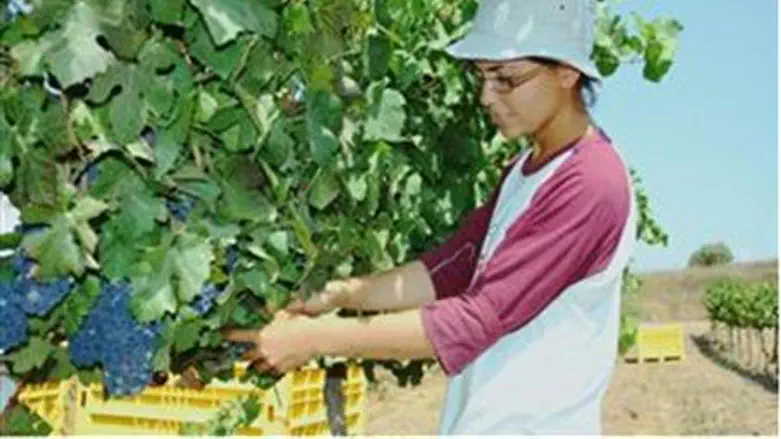
Vineyard owners in Kibbutz Merom in the Golan rushed to harvest their grapes early this week as the most intense heat wave in 10 years gripped the country, causing the grapes to mature two weeks earlier than expected. The grapes being picked in kibbutz's (cooperative community) early harvest are used to make champagne.
Farmers were pleased to report that despite the heavy heat, the quality of the grapes was as high as ever.
Israel was hit last week by a heat wave hotter and longer-lasting than the country has seen for decades. Temperatures began to descend on Sunday and are expected to continue to drop during the week; however, a new heat wave is predicted beginning on Saturday.
In Kibbutz Merom, the champagne grapes are being harvested by hand in order to preserve them in prime condition. Grape-growers were joined in the harvest by young men and women, many of whom recently completed their IDF service and signed on to work in agriculture due in part to a government program that rewards former soldiers who work in fields with few Israeli laborers.
Farmer and coordinator Gabi Kuniel said the kibbutz expects to produce more than 500 tons of grapes this year, which will be used to make many different kinds of wine.
Among the wines produced at the kibbutz is “Ice wine,” a sweet dessert wine made from frozen grapes. Most ice wine is produced from grapes grown in Canada or Europe, where the grapes are harvested in winter after freezing naturally on the vine. As temperatures in the Golan are not low enough to freeze the grapes naturally, they are picked and then immediately frozen while still fresh.
The kibbutz has planted champagne grapes on 70 dunams, and expects to have collected approximately 50 tons of fruit when the harvest is over.
Tal Pelter of Pelter Winery explained that the grapes picked this week will be available to purchase in the form of bubbly champagne only in another three years. First the grapes are turned to juice, which undergoes primary fermentation for five months. Sugar and yeast are then added to the bottle, and the wine goes through a secondary fermentation process.
The wine is aged for two years. The bottle is then manipulated so that the yeast sinks to the neck, a process that lasts for one month. The neck of the bottle is frozen, and the cap is replaced with a traditional champagne cork.
Experts predict that Israeli vineyards will produce a total of 50,000 tons of wine grapes this year, up from 47,000 tons last year.